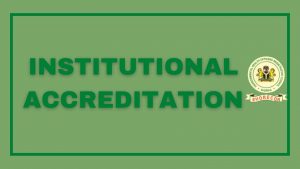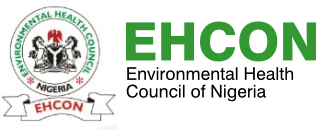PROCEDURE FOR ACCREDITATION OF ENVIRONMENTAL HEALTH PROGRAMMES IN TRAINING INSTITUTIONS

The Environmental Health Council of Nigeria (EHCON) established by Act 11 of 2002 (As Amended) regulate the practice of Environmental Health Profession in Nigeria. The mandates of the Council given in section 1 includes “determining what standards of knowledge and skill are to be attained by persons seeking to become members of the profession of Environmental Health Officers and improving those standards from time to time as circumstances may Permit’’.
ENVIRONMENTAL HEALTH PROGRAMMES FOR ACCREDITATION
The following Environmental Health programmes are available for mounting by any Institution that has adequate facilities and resources for the sustainable running of the Programmes ha met the basic requirement for accreditation.
- National Diploma in Environmental Health Technology
- Higher National Diploma in Environmental Health Technology
- National Diploma in Public Health Technology
- Higher National Diploma in Public Health Technology
- National Diploma in Epidemiology and Disease Control Technology
- Higher National Diploma in Epidemiology and Disease Control Technology
- Bachelor of Environmental Health Science (B.EHS)
Click for the Reviewed Services Fees.
GENERAL PROGRAMME STATUSES
There are four (4) accreditation statuses namely:
A. PROVISIONAL ACCREDITATION
This is a status granted to a new programme by the Council after a successful visitation by the Council and it lasts for two years.
B. FULL ACCREDITATION
This is a status granted to a programme following a successful visitation by the Council and it lasts for five years.
C. RE-ACCREDITATION
This is a status granted to a programme with full accreditation status and also lasts for five (5) years following the procedures as in full accreditation.
D. RE-VALIDATION
Where a programme changes its location to a new site, it automatically loses its existing accreditation status.
ELIGIBILITY FOR MOUNTING OF ENVIRONMENTAL HEALTH PROGRAMMES
Any Public or private Colleges of Health, Monotechnic, Polytechnics and Universities in Nigeria interested to mount any of the Programme(s) shall apply to the Council and will be given the guidelines and a self-study questionnaire which is to be completed and returned with relevant documents and the prescribed fee for resource assessment visit. If the Council is satisfied with the minimum human and material resources provided for the programmes which will aid in imparting the required knowledge, skills and competencies to the prospective professionals, an assessment team is deployed to the institution to do a physical assessment and verification of the claims submitted by the institution. The team subsequently writes a report of the inspection and submit to the Council for review and approval; the outcome of which will be communicated to the institution.
REQUIREMENTS FOR MOUNTING ENVIRONMENTAL HEALTH PROGRAMME(S)
- Establishment- Institutions seeking for accreditation of any of the Environmental Health Programme(s) must be established by law for public institutions: while privately owned institutions, shall be registered and be in good standing with the Corporate Affairs Commission as a company limited by shares.
- Governing Council- Institutions established by law must have a Council in place. Institutions without governing council for a period of two years will not be visited by the Council.
- Land/Site- The Institution must own a sizeable land capable of hosting all the required facilities and other resources need of the programme(s)
- Buildings- The Institution must have adequate structures capable of accommodating the programme including all learning facilities such as laboratories, classrooms, library, workshops, hostel, studios, offices etc
- Water Supply-The Institution must have potable and adequate source of water supply.
- Electricity supply- The institution should have constant electricity supply and alternative source of power (Thermal, Solar, Wind, National Grid)
- Access Road- The institution must have good access road and road network within the campus with good landscape.
- Communication- There must be good means of communication within the campus and outside
- Staff/student Welfare- There must be provision for social amenities within the campuses for both staff and student.
- Accommodation- There should be good accommodation for both staff and students, where not available alternative arrangement should be made within the community
- Recreational Facilities- The institution should provide sport facilities for both staff and students.
- Cafeteria- Institution should provide good catering services for both staff and students
- Health Care Facility-The institution should have health care facility for emergencies and treatment of minor ailments with qualified health personnel.
- Insurance- There must be provision of insurance for both staff and student
- Ambulance- Ambulance should be provided for emergency.
- Environmental Sanitation- The institution must provide good and adequate sanitary conveniences with gender demarcation, waste disposal facility and promote aesthetic value in the campus.
- Security- There should be adequate security for staff, students and facilities.
- Transportation/Logistics- There should be good transport system for both staff and students to and fro the campus
- Pension Scheme- There should be pension scheme for staff
- Funding- There should be adequate funding of the programme to ensure sustainability
- Teaching Facilities- There should be good and adequate teaching facilities such as classrooms, laboratory, workshops, studios, library, teaching aids, internet, audio-visuals etc
- Human Resources- There should be adequate and qualified teaching staff, service staff, technical staff and administrative support staff
- Practice Areas- There should be adequate arrangement for field work facilities for students.
QUESTIONNAIRES FOR ACCREDITATION OF BEHS
Questionnaire for ND and HND Accreditation
